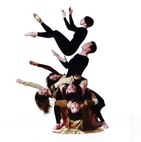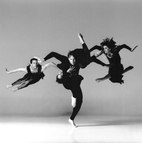|
 |
|
|
 |
 |
The Parsons Dance Company
www.parsonsdance.orgDavid Parsons, Artistic Director Elizabeth Koeppen, Associate Artistic Director
Tim Cynova, Acting Executive Director
Rosemary McCarthy, Marketing and Operations Manager
Brian K. Hillman, production Stage Manager
Ashley Trimble, Company Manager and Assistant Stage Manager
Howell Binkley, Lighting Designer
John Mackey, Music Director
Jovanna Huguet, Ellen Jacobs Associates, Publicity, ejacobsassociates@earthlink.net
Presented at the Joyce Theater
www.joyce.org
A review of the David Parsons Dance CompanyBy Robert Abrams
October 29, 2002 I think that part of the reason I have so much trouble with modern dance is that I am part of a generation that has been socialized by the three to four minute pop song. Anything longer feels wrong as a result. That being said, I also feel that many works of modern dance choreography take an interesting movement concept and try to stretch it out through repetition and variation. Often a clear superstructure, whether in the form of a narrative or in the pacing of the movement, is missing, which leads to interesting concepts that are well danced, but which don't particularly go anywhere. I thought that the dances this evening ranged from spectacular to enjoyable. The works I liked best tonight were those that showed off the movement with full energy. These were Takademe (which I believe is Greek for "the woman in purple", danced by Katarzyna Skarpetowska), and The Hunt (danced by John Carroll/Timothy Bish, Marty Lawson, Michael Snipe and Brian McGinnis). Takademe was worth watching because not only did it show off the Parsons style of dance, it allowed the audience to see something of the person dancing, not just a formal series of movements. Takademe was a kind of externalized, vocalized tap dance routine. It took risks that paid off in expressive movement that showcased the interior strength of the performer. The Hunt was less personal, but very forceful. Almost demonic in its level of energy (although this may have had a lot to do with the self-suggestive power of the shades of red that were used in the costumes and the lighting). It was, as generally noted above, a little long, but it had sufficient energy to carry it through despite its somewhat flat superstructure. The Hunt looked distinctly like a summoning dance, and in this regard would fit quite well on Charmed, the TV show. The dancers would end up summoning a powerful demon who will try to destroy the Charmed Sisters, only to be vanquished by some soup and a poem. This will free the dancers from their enchantment that forced them to summon the demon in the first place. Since the dancers mostly fit the description of the sort of hunky guys the Charmed Sisters favor as boyfriends, one of the dancers would stick around for a couple of episodes until he realizes that his girlfriend is spending all her time saving innocents, and neglecting him. Mr. Battle, the choreographer, would have to cut The Hunt down to a three minute excerpt for this to work of course. For some reason, for the most part, the dancers seemed to be the most expressive and energetic when they were dancing barefoot. The first work performed tonight, Gloria, seemed to be a dance about an obsessive compulsive person, but I could be wrong. It was mostly fluid. Rather like a ballet with some angular modern accenting, such as leg extensions with the feet at right angles to the extended leg. Portions of the work were frenetic with clock-like movements very similar to Grupo Corpo, except that in Gloria the clock movements were accents stuck in the middle of a segment that seemed to suggest the Sound of Music, where as in Grupo Corpo the clock-like elements were a major signature movement. This isn't good or bad either way. My assessment, as an external evaluator, is that Gloria is the sort of modern dance someone who is into ballet would greatly enjoy. Act II started with Kind of Blue. It was jazzy. To me it seemed like it was danced but not felt. The energy was at about 80%. The atmosphere felt like a ballroom studio party full of modern dancers. Kind of Blue was followed by Caught. This work was most notable for its creative use of strobe lighting to create the illusion that the dancer was flying through the air for extended periods of time without ever touching the ground. The final work was Too Many Cooks! It looked like a Broadway dance number for the most part. They had good energy even though they were wearing shoes. It was amusing and inventive, but it needs a plot. Even a paper thin excuse of a plot would help tie the separate cooking related dances together. The seeds of such a plot are already in the work. There is a domineering head chef that could be expanded into a full blown character. And, what the heck, give the dancers some dialogue. Maybe even dance with working ovens so that as the dance progresses, the Joyce would fill with the aroma of baking bread. In Too Many Cooks!, and elsewhere, partner dance was performed mostly as stylized accents. I think that if they strengthened their partner dancing, it would raise the energy up in key moments. And they definitely need to fix the technique in the American Tango segment. The dancers were using the stiff arm promenade style which was originally developed by Groucho Marx as a parody. Unless there is a clear choreographic need to reference the Groucho Marx tradition, the dancers would be better off using proper American Tango technique. The Argentine Tango segment was fine as a stylized accent, although a serious Argentine Tango dancer might have raised an eyebrow. Too Many Cooks! was well done in all its parts, but as a whole, as Emeril might have said, they could kick it up a notch. Everybody else in the audience seemed to be wildly enthusiastic about all of the dances. In general, I thought the show worked best when they took risks. On the other hand, it is to the Parsons Dance Company's credit that they could present works with a range styles (balletic, full modern, novelty, Broadway). As such, one can't expect every work to be perfectly suited to every audience member's tastes. There was plenty of great dancing and choreography to make the evening worth attending. David Parsons and the David Parsons Dance Company
Photos courtesy of Lois Greenfield    

|
|
|






